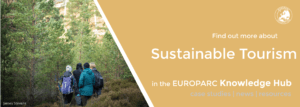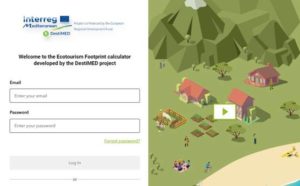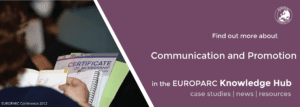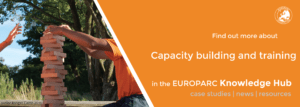Documentary ‘A Sustainable Journey’ wins 3 new awards at film festivals
Winners of the 12th ART&TUR Festival.
A Sustainable Journey, film on sustainable tourism produced by EUROPARC Federation in the framework of the CEETO Interreg Central Europe project, was awarded with three new awards at two recent film festivals: the 12th edition of the ART&TUR – International Tourism Film Festival, and the 10th Amorgos Tourism Film Festival.
Three new awards for ‘A Sustainable Journey’
After winning the Best Movie Promoting Sustainability at Terres Travel Festival in May, ‘A Sustainable Journey‘, short documentary produced by EUROPARC Federation within the CEETO Interreg Central Europe project, won 3 new prizes at recently organised Tourism Film Festivals:
- 1st place in the Documentary section, “Sustainable and Responsible Tourism” at the Amorgos Tourism Film Festival;
- 1st place in the category “Environment and Ecology” at the ART&TUR Film Festival;
- 2nd place in the category “Short Docs (up to 30’)” at the ART&TUR Film Festival;
A Sustainable Journey won the Best Documentary at the Amorgos Film Festival, first place in the category ‘Environment and Ecology’, and second place in ‘Short Docs’ at the ART&TUR Festival.
A Sustainable Journey – The Film
The 9 minutes short film portrays the story of a traveler seeking to escape the pressures of everyday life to a different kind of tourism that he believes will be good for nature and good for him too. The objective of the film is to raise awareness among travelers and local communities on the importance of sustainable tourism.
For the production of this movie, sustainable industries and local producers certified with the European Charter for Sustainable Tourism were meticulously selected and recorded in order to lead with the example for future sustainable destinations.
The full movie was released on the European Parliament in November 2018, with parallel screenings in the different regions that take part in the CEETO Interreg Central Europe project. You can see the movie and download a copy of the Promotional Material adapted for web distribution in 5 different languages (English, German, Italian, French and Spanish) on CEETO webpage A Sustainable Journey – The Film.
Amorgos Tourism Film Festival

Winners of the 10th Amorgos Tourism Film Festival
The International Amorgos Tourism Film Festival is an annual four-day event organized by the Cultural Women’s Association of Tholaria-Aigiali, Amorgos. It started in 2010 during the 8th International Congress of Culture and Tourism YPERIA and is held continuously since then, presenting about 100 new films each year.
Each year, it awards the best choices of documentaries, and travel films that contribute to the development of domestic and foreign tourism and to the implementation of green practices, taking into account the need for social responsibility and sustainable development. The main purpose of the Festival is to create an international platform for enhancing global tourism through audiovisual media.
ART&TUR Festival
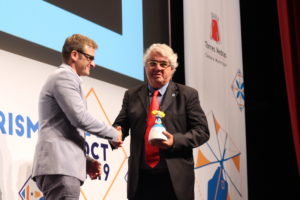
Paulo Castro, the Vice-President of EUROPARC Federation at the ART&TUR Festival Award ceremony.
Since its 1st edition in Barcelos in 2008, the ART&TUR International Tourism Film Festival has been following the mission of making known to the world the best tourism-related audiovisual productions in Portugal and in the world.
This year, the 12th edition of the Festival took place from 22nd to 25th October 2019 in Torres Vedras, Portugal. In this edition, films were submitted from 52 countries from all continents. In total 331 films were competing: 219 films submitted to international competition and 112 films submitted to national competition.
Measure the Ecological Footprint of your Ecotourism Itineraries
Source: Global Footprint Network
Does your Protected Area offer ecotourism itineraries and sustainable destinations? Find out what is their Ecological Footprint with DestiMED’s Calculator. The Calculator enables to measure and monitor the Ecological Footprint, based on the 4 main aspects of an ecotourism package, i.e. accommodation, food & drinks, mobility & transfer activities and services.
Free online calculator
To help Protected Area managers and tourist operators in creating a proven sustainable experience, the DestiMED project has created this free online calculator to measure the Ecological Footprint of ecotourism itineraries.
Ecotourism is a great tool to promote the unique value of nature and Protected Areas, while creating revenue for local communities.
The calculator was created with the support of the European programme Interreg-MED and addresses mainly Protected Areas of the Mediterranean region. It evaluates 4 main aspects of ecotourism packages:
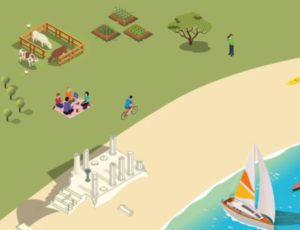
Source: Global Footprint Network
- Accommodation
- Food and Drinks
- Mobility and Transfer
- Activities and Services
The assessment is conducted annually to help the local ecotourism businesses and public authorities understand and address the impact of their ecotourism products while ensuring their high quality.
What is the Ecological Footprint?
The Ecological Footprint is an indicator and a methodology developed by Global Footprint Network to measure the ecological assets required by a given population to produce the natural resources it consumes, and to absorb its waste, especially carbon emissions.
The DestiMED Project managed to adapt this methodology to ecotourism packages in Protected Areas. Moreover, the tool offers specific information on:
- The Ecological Footprint of the whole ecotourism package (in gha per package)
- The Ecological Footprint per tourist per day (in gha per tourist per day)
How to use the Calculator?
To get started, you will need to register on the platform by creating a new account. All the steps are then explained in an introductory video.
Entering the data
For each ecotourism package, you will be requested to provide the number of days and of participants. In each of the categories (accommodation, food & drinks, mobility & transfer activities & services) the questions will focus on the type of supply and how it is provided.
It is strongly recommended to get in touch with your service providers involved in the package (all the hotels, restaurants, providers of transport and guides/providers for each activity) and to visit them in person to ensure that data is collected as precisely as possible.
Lower your Ecological Footprint
Results from the DestiMED project illustrate that a low Ecological Footprint of tourism can be achieved by:
Staying at small-scale, family-run, local and traditional housing accommodations, preferably with renewable energy sources in place. Although large hotel chains are often very resource efficient because of economies of scale, these small-scale hotels will reduce the accommodation Footprint by as much as 48%, Global Footprint Network found.
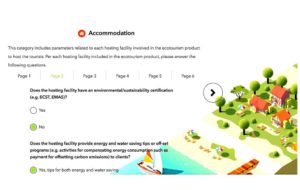
Source: DestiMED project
Eating food sourced locally or regionally, offered through the typical Mediterranean diet providing an abundance of vegetables and grains, and less animal protein-based products (non-endangered fish-based products and non-intensive meat based-products).
Buying local and organic food products improves each meal with a tasty Footprint reduction of 5%, Global Footprint Network found. This can really add up over the course of a trip! Considering the quantity of food consumed: light and balanced dishes are favored over lush, bountiful, and never-ending banquets.
Carbon-free activities that allow you to enjoy the slow pace of the natural areas and re-discover the original rhythm of nature.
Traveling “slow” by using alternative and motor-free modes of transportation as much as possible. Walking, as well as using bikes, kayaks, horses, or even public transport, is preferred to carbon-intensive transportation. An electric vehicle will help reduce the Footprint by 40-50%, Global Footprint Network found, and a bike ride means no Footprint at all!
For further enquiries contact carla.danelutti@iucn.org.
Communicating Protected Areas in Europe: a Study Tour outcome
Triglav National Park
Article issued by Baiba Ralle
Every year, the Alfred Toepfer Natural Heritage Scholarship supports the work of young professionals in protected areas across Europe. Baiba was one of the winners of the Scholarship in 2018. Read about her Study Tour, exploring the topic of ‘Communicating Protected Areas in Europe’.
Raising environmental awareness
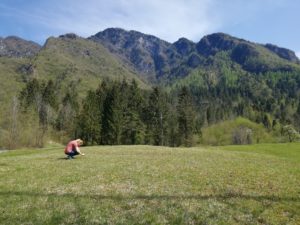
Dolomiti Bellunesi National Park
Communication of protected areas is one of the most important issues nowadays. Since society in its wider sense is the one who directly and indirectly impacts nature conservation processes, only raising its awareness of the importance of nature values can bring sustainable development for future generations. Therefore, managers of protected areas (PAs) are currently in front of an important task to reach human minds in the most effective way to activate their care for ongoing local and national nature processes.
To ensure sustainable development for future generations, society needs to be better aware of the importance of nature.
To improve communication practices of PAs in her country, Latvia, Baiba Ralle made a study tour to four different protected areas in Europe. The objective of the study was to examine how these PAs are organizing communication process, what kind of actions they are proud of and what are the challenges they have to overcome when dealing with this difficult topic.
Watch a short video about her Study Trip:
The study tour was organized in protected landscape area Central Bohemian Uplands in Czech Republic, Saxon Switzerland National Park in Germany, Dolomiti Bellunesi National Park in Italy and Triglav National Park in Slovenia. While visiting PAs, the main interest was to meet PA professionals and discuss their practices in public relations, nature education, society involvement and sustainable tourism.
Despite the situation being very different in different PAs in Europe (administration, financial support and overall governmental system, cultural level, etc.), it turned out that all the territories are facing almost the same challenges which has led to the result of setting up communication work as inseparable unit in official documents dedicated to establishment of PA as a platform of conservation of nature and culture values.
Creativity to overcome lack of finance
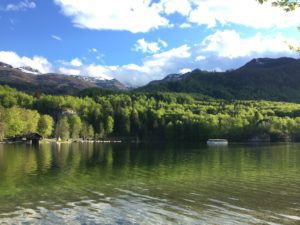
Triglav National Park
One of the biggest challenges in the nature conservation process that all the visited territories are facing and overcoming is insufficient financial support for communication and education activities. Therefore, the study visit has showed that PAs are subjects of creativity and cooperation, of managing and/or supporting different outstanding projects/ methods/ solutions towards more successful /sustainable ways of protecting and conserving nature and cultural values of PAs for coexistence of both – nature and human beings in the future.
PAs use creativity and cooperation to find more successful ways of protecting and conserving nature and cultural values.
All the territories are dealing with the constantly growing number of visitors and struggling/working with solutions to handle such a big number of people coming to the territory for nature recreation and education in very different patterns (mostly active recreation – the biggest threat for nature).
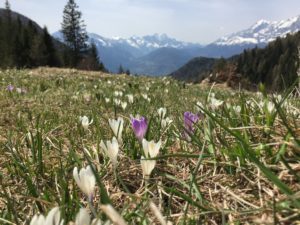
Dolomiti Bellunesi National Park
For all visited territories, biodiversity conservation challenges are crucial, including tireless “translation” work on the topic of nature friendly attitude and behavior towards nature conservation, explaining these matters in popular language that people can relate to and understand, while using PAs facilities.
It is very well done by establishing differently managed information centers and points with different exhibitions, functions and activities, creating brilliant communication campaigns on sustainable tourism matters addressed to wide audience, as well as nature education programs offered for schoolchildren – very important audience who will impact the nature processes in the future.
Innovative nature classes for children
Nature interpretation has become extremely important due to the current situation, when it is very hard to keep children’s attention. Nature education work in all visited PAs tends to walk out of the standardized education systems still implemented at schools, and instead make schoolchildren use all senses during the nature classes – sight, hearing, smell and touch, thus grabbing participants’ attention and reaching the aim of understanding nature and insuring long term conservation and management aims.
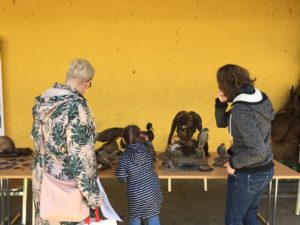
Central Bohemian Uplands, Earth day
Due to lack of human resources, PAs have given great models and examples of how effective in nature education can be cooperation with (1) non-governmental entities, (2) officially established Parks’ Guide network or (3) joint cooperation with university students and some source of funding.
Visited territories have brought evidence and highlighted both the importance of traditional forms of communication still in place, especially regarding communication with local communities (in many territories there is a big issue of constantly aging inhabitants and therefore extreme importance for consumption of traditional media), as well as growing importance of social media in the communication with younger audience – potential PA visitors, living only in this informative space.
Involving local inhabitants
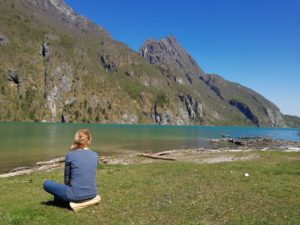
Dolomiti Bellunesi National Park
PAs have also done great efforts regarding local population and economic sectors, trying to reach the aim of locals as conscious members of PA’s structures, feeling the area as a powerful tool to support their business needs and cultural identity, as well as having an empathy and interest for to the protection needs of the territory.
They have showed good example of successful cooperation with local inhabitants within the aim to save Park’s agricultural heritage, as well as to provide local inhabitants the possibility to become volunteer rangers (nature protection guards) of the territory, thus involving local people in the nature awareness raising activities and ensuring their loyalty to the PAs. Another important direction PAs are working towards is sustainable tourism – some efforts include creation of supportive systems for local businesses and producers like quality mark, as well as participation in the European Charter for Sustainable Tourism in Protected Areas.
Overall, the study tour has showed how great communication efforts in different European PAs are being made to change attitudes and behavior of people in the sense of nature conservation step by step, paving the positive outcomes for future generations.
The study has resulted in a full bunch of new tools and ideas, an inspiration to improve communication practices not only at Baiba’s home institution, but also all around Europe, to reach effective improvement of public awareness and sense of ownership of our common natural and cultural heritage, which is the basis for sustainability of any conservation efforts. It is critically important to pass good knowledge from country to country, and connect them for the most positive result in the future.
G-BIKE: 1st Training School in Genomic Biodiversity for Resilient Ecosystems
Source: G-BIKE Website
In a rapidly changing environment, the resilience of ecosystems depends ultimately on species adaptability. G-BIKE aims to provide tools for assessing, monitoring and managing the genetic resilience and related adaptive potential of wild and captive populations in the EU. Applications for the 1st G-BIKE Training School are now open!
Genetics for conservation
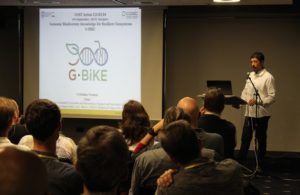
G-BIKE meeting in Sarajevo. Source: G-BIKE Website
Although genetic data can be obtained for most organisms, the standardization of protocols for detecting and monitoring species’ genetic diversity, and their potential for adaptation, is still lacking. G-BIKE hopes to assist scientists and practitioners across the EU, and particularly in COST Inclusiveness Target Countries, to integrate genetic and evolutionary knowledge into conservation planning policies.
Funded by the European Cooperation in Science and Technology (COST), the project also strives to promote cross-border management and long term monitoring programs of evolutionary potential in order to ensure persistence of populations and species, and the continued supply of nature-based ecosystem services.
Apply for the 1st G-BIKE Training School
Applications are now open for the 1st G-BIKE Training School that will be held in La Valletta (Malta) between the 20 and 22 January 2020. The event is entitled ‘Genomic tools for conservation: a practitioner’s guide’ and is mainly, but not exclusively, addressed to practitioners. The aim is to present, in the most comprehensive manner, how can genetics and genomics help to solve practical conservation and management problems.
The ‘Genomic tools for conservation: a practitioner’s guide’ will present, how genetics and genomics can help solving practical conservation and management problems.
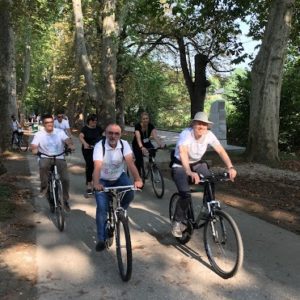
G-BIKE meeting in Sarajevo. Source: G-BIKE Website
The school should also work as a platform for scientists and practitioners to exchange information and ideas, to explore and clarify where and when genomics can make a difference in every day conservation activities within an EU policy and legislative framework. At the beginning, trainees will be asked to offer a short presentation about the main conservation challenges of their current jobs where they think genetic tools might help.
At the end of the School, participants will revisit the presentations and discuss the options and potential strategies that can be applied, using the genomic and analytical tools described during the School.
This School may also be relevant to graduate students about to embark on conservation genomics projects, to help them develop workplans, and just as important, to allow them to make their work policy and management oriented from the outset.
Find more information about the programme and trainers, and apply here before December 8th.
